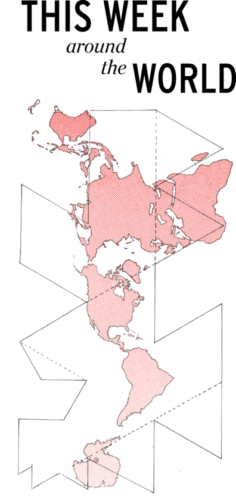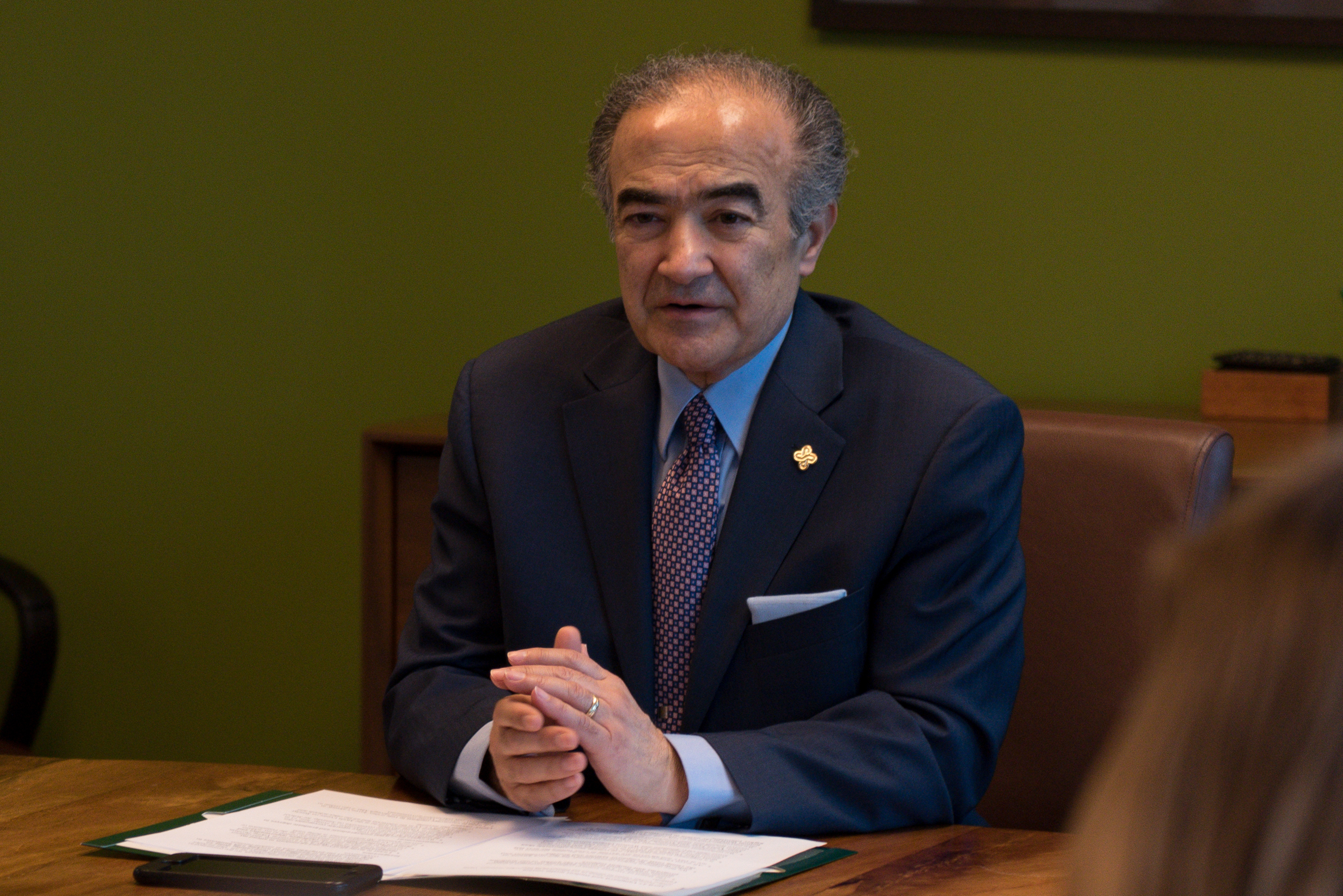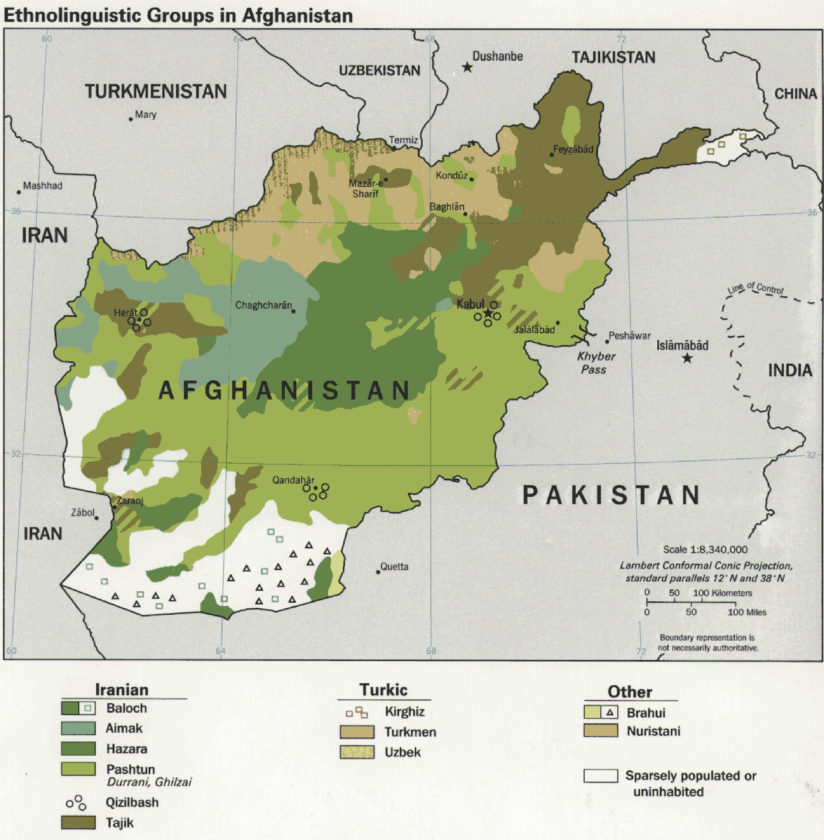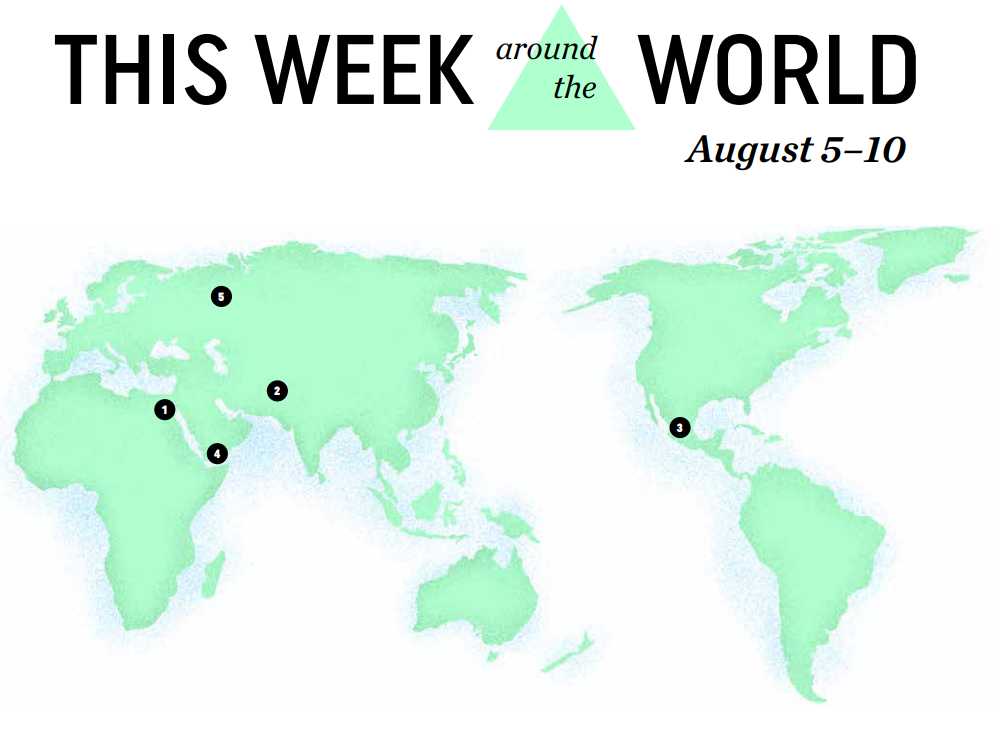July 8 Eritrea: Efforts to normalize relations between Eritrea and Ethiopia continued in a landmark meeting between Ethiopian Prime Minister Abiy Ahmed and Eritrean President Isaias Afwerki, the first of its kind in more than 20 years. The two met in Asmara, the capital of Eritrea, on Sunday, July 8, and that evening announced normal operations of airlines and ports would begin, along with movement between the two countries and the opening of embassies.
July 8 Morocco: Forty-five migrants died after their boat sank while trying to reach the Spanish coast. Local authorities recovered the bodies from the Atlantic Ocean near the city of Larache in northern Morocco July 8 after they were notified. No further details have been released.
July 8–9 Turkey: A train en-route to Istanbul derailed in the northwest Tekirdag region, killing 24 people and wounding at least 73. The train was carrying 362 passengers when five of the six cars derailed from the tracks on the evening of July 8. The National Medical Rescue Team, Disaster and Emergency Management, the military, locals and other health personnel assisted in rescue efforts. Officials blamed heavy rains and landslides in the region for the derailment.
Separately, Following elections in late June, President Recep Tayyip Erdoǧan was sworn into office in the capital of Ankara. Though Erdoǧan has been president since 2014, he is the first executive president since the country changed from a parliamentary system in last year’s constitutional referendum. Under the new executive presidential system, the position of the prime minister is eliminated and the president has the authority to dissolve parliament, appoint or remove vice presidents and other officials, issue executive orders and impose states of emergency.
July 8–15 Iraq: Southern Iraq experienced a wave of protests as people from in and around the city of Basra demonstrated over the need for clean water, jobs, electricity and basic infrastructure in an area known for being oil-rich—according to Middle East Monitor, over 95 percent of the state’s revenue comes from Basra oil exports. Police fired on protesters July 8, killing one and wounding at least eight, and opened fire again on July 15 as protesters attempted to storm a government building. Internet in the city was shut down and telephones were disconnected; however, protests have spread to other parts of the country, including Baghdad, Karbala and Najaf, where they stormed the international airport.
July 9 India: The Supreme Court upheld the death sentence against four of the six men arrested for gang-rape in New Delhi. Three of the four men convicted and handed the death sentence appealed the courts for review last year; of the other two involved, one was a juvenile sentenced to a reform facility and released in 2015, while the other committed suicide in prison. In 2012, 23-year-old paramedical student Jyoti Singh Pandey was on a moving bus with her friend Awindra Pratap Pandey when she was brutally raped and beaten by six men for several hours. She was also violated with a metal rod which caused severe damage to her intestines, and she later died of her injuries.
July 9 Myanmar: Two Reuters journalists detained in December have been charged by a Myanmese court of violating the Official Secrets Act, a law enacted in 1923 under British colonial rule. The journalists involved, Wa Lone and Kyaw Soe Oo, obtained secret documents concerning military operations in the Rakhine state where Rohingya Muslims have been historically targeted. Currently some 700,000 Rohingya reside in refugee camps in neighboring Bangladesh after facing extreme levels of violence including ethnic cleansing, pillaging, and rape by Myanmar security forces. Lone and Soe Oo have pleaded not guilty, and their next hearing will be July 16.
July 10 Thailand – Update: All members of the football team stuck in the Tham Luang cave have been rescued, 18 days after flooding from monsoon rains trapped them inside. Four members of the team were rescued July 8 and another four were rescued July 9, the remaining five including the coach rescued the evening of July 10. According to Al Jazeera, 19 divers assisted with the rescue on Tuesday, and more than 1,000 rescue workers were involved with the overall efforts.
July 10–13 Pakistan: The country is experiencing an increase in attacks as they prepare for general elections scheduled for July 25. On Tuesday, July 10, 20 people including the popular politician Haroon Bilour were killed at a rally while 69 others were wounded in a suicide attack claimed by the Pakistani Taliban. On Friday, July 13, two campaign events were targeted in northwest and central Pakistan. The northwest attack left four people dead and 19 wounded after an explosion targeted an election rally. The attack in central Pakistan killed 149 people, including one politician running for office Siraj Raisani, and wounded another 189 after the suicide attack that evening, with both the Islamic State group and Pakistani Taliban claiming responsibility.
July 10–14 Egypt: The bodies of three children were found July 10 after a woman noticed dogs scavenging what appeared to be rubbish on the street. The children, estimated to be aged 1, 3 and 5, were found mutilated, rotting and wrapped in garbage bags. According to Egypt Independent, an investigation team has been assigned led by both the Director of Giza Security and Director of Giza Investigation, and surveillance cameras in the area or being examined.
In Cairo, 37 people, including doctors and nurses, were convicted of human organ trafficking by the Cairo Criminal Court July 12 following a 2016 investigation into organ harvesting at private facilities. Of the 41 originally accused, six will serve 15 years in jail, 11 will serve seven years, 20 will serve three years, three were cleared of all charges and one died before the final verdict. Those convicted received fines ranging between 200,000 Egyptian pounds (approximately $11,000 U.S.) and 500,000 EGP (approximately $28,000 U.S.).
July 11 Brussels, Belgium: During a NATO summit, President Donald Trump demanded NATO members make immediate payments amounting to two percent of their respective GDPs to the United States, or face risking the U.S. rescinding its membership. Additionally, Trump also made a comments claiming, “Germany…is a captive of Russia” and “Germany is totally controlled by Russia,” alluding to energy deals between the two countries.
July 11 Srebrenica, Bosnia and Herzegovina: Thousands gathered in Srebrenica to attend funerals and commemorate the 23rd anniversary of the Srebrenica massacre, sometimes referred to as the Bosnian genocide. Commonly considered Europe’s worst humanitarian crisis since World War II, in 1995, around 8,000 Bosnian Muslim men were killed and 23,000 women, children, and elderly were forced to leave, though the numbers are much higher when including the Bosnian War from 1992 to 1995. Thirty-five recently identified victims of the massacre were also laid to rest in Srebrenica, and experts are still working to identify victims of mass graves.
July 12–15 London, UK: President Donald Trump landed in London for a four-day official visit to meet with political leaders including Prime Minister Theresa May and Queen Elizabeth II. While on Thursday, July 12 relatively light protests occurred, Friday, July 13 saw some 250,000 people take part in political demonstrations against Trump’s visit, which included a 20-foot-tall baby blimp in the likeness of Trump.
July 13 Brazil: The son of a prominent congressman running for president posted a doctored photo on Twitter featuring an LGBT poster with an additional ‘P’ with the descriptor ‘Pedosexual’. The photo was intentionally made to appear as though LGBTQ+ groups and communities advocated for pedophilia in order to incite hatred. The owner of the post, Carlos Bolsonaro, is a member of the Social Christian Party and the son of Jair Bolsonaro, a far-right politician known for his praise of military dictatorships and lewd comments involving rape.
July 14 Gaza: Haaretz reported the largest daylight attack since 2014 has left two Palestinian teenagers dead and 14 wounded in the Gaza Strip while four Israelis were lightly injured after an exchange of airstrikes and rocket fire between Israel and Gaza. Videos released by a local Palestinian news source Ma’an show the victims who later died of their wounds lying on the ground as bystanders attempt to assist in one video, while the second video shows Israeli footage of the airstrike at moment of impact.
July 14 Italy: Approximately 450 migrants on board an overcrowded ship were rescued from the Mediterranean Sea by an EU border agency and Italian police after Malta refused rescue operations. Eight of the migrants are receiving medical treatment on the island of Lampedusa while the rest wait on board as the Italian government looks for countries willing to take them since the far-right Interior Minister Matteo Salvini has denied their entry to Italy.
July 14 Israel: Approximately 2,500 people came out to the streets of Tel Aviv to protest a controversial Likud-sponsored bill which would have constitutional-like status. Haaretz reported the nation-state bill would prioritize Israel’s Jewish identity over a democratic one, favoring those with Jewish religious backgrounds, which critics claim would invite discriminatory practices towards minorities including Arabs, Mizrahis, and Ethiopians as well as divorced women and those in the LGBTQ community. Around 20 percent of Israel’s population does not identify as Jewish.
July 23 Germany: German football star Mesut Özil resigned from the international arena, stating he will no longer play for Germany due to feelings of racism and disrespect. Özil, who is third-generation Turkish German, received backlash from German politicians who questioned his loyalty to German democracy after being photographed with Turkey’s President Recep Tayyip Erdoǧan in May 2018. Özil said he received hate mail and was blamed for Germany’s defeat in the recent 2018 World Cup, stating, “I am a German when we win, but I am an immigrant when we lose.”
July 23 Sweden: Swedish student activist Elin Ersson successfully impeded the deportation of an Afghan asylum seeker when she refused to sit down until he had been removed from the plane. Ersson, a student at Gothenburg University, originally bought a ticket for the flight with fellow activists when they learned of the deportation. Sweden’s government has been deporting Afghan asylum seekers en masse after determining the country is safe despite the continued attacks by groups like the Taliban and the Islamic State group.
July 23 Toronto, Canada: A mass shooting left two dead and 13 injured in the Greektown neighborhood. According to The Toronto Star, the assailant calmly walking down a street, firing into restaurants and reloading intermittently. After exchanging fire with police, he fled and was found dead with a gunshot wound. Witnesses described hearing 20–30 shots fired, with one victim shot two to three times. The deceased victims were aged 10 and 18, and another child is in critical condition.
July 24-28 Afghanistan: According to the Afghan media TOLO News, some five or six explosions hit the capital city of Kabul via rocket fire in the early afternoon of July 24. At least one rocket landed on a house with civilians inside while the others hit the slope of a nearby mountain. Some speculate they were aiming for the local Police Academy. At least seven people were injured with three hospitalized from serious injuries.
In a separate incident on July 28, gunmen raided a medical training facility for midwives after multiple explosions hit the city of Jalalabad. Afghan special forces were deployed and a six-hour battle over the facility began, after which all assailants were confirmed dead. At least two people were killed and eight wounded, including five civilians. The facility at the time had 69 people inside, 57 of whom were able to escape during the battle with aid from special forces. The Taliban has denied involvement in the attack and no other group or individual has claimed responsibility yet.
July 24 Israel-Syria: The Israeli military shot down a Syrian Sukhoi fighter jet after monitoring its movements around the occupied Golan Heights. An Israeli military spokesman said the jet breached the Golan Heights at a relatively high speed when it was shot down. It is not confirmed if the breach was intentional. The Syrian state media claim the jet was still inside Syrian airspace at the time while conducting raids against the Islamic State group in Syria’s southern region.
July 25 Pakistan: Amid a surge in violence and suicide attacks targeting political rallies, voting in Pakistan’s general election began at 8 a.m. local time with some 800,000 security personnel protecting the country’s 85,000 polling stations. Despite the security deployment, at least 31 were killed and more than 40 wounded near a polling station in Quetta after a suicide explosion targeted a police convoy.
Of the 106 million registered voters, Pakistan Today reported 51.8 percent voter turnout. The election decided 272 contestable seats with three main parties and a number of independents. Pakistan Tehreek-e-Insaf party led by Imran Khan was the decided victor at 116 seats, followed by Pakistan Muslim League-Nawaz with 63 seats and the Pakistan Peoples Party with 43 seats.
July 26 Philippines: President Rodrigo Duterte signed the Bangsamoro Organic Law giving autonomy to the Moro minority group after almost five decades of conflict in the region. The Moros, which make up around 11 percent of the population, are Muslim communities living mainly on the islands of Mindanao, Palawan and Solo. With the new law, the Moros will be able to form a government for the Bangsamoro Autonomous Region, which will have a judicial system and parliament independent from the national government.
July 28 India: A bus carrying employees of the Dapoli Agriculture University fell into a gorge while driving on the mountain road of Ambenali Ghat. The bus was en route to a scenic area in Mahabaleshwar where the university employees were planning to have a picnic. Out of the 34 passengers, only one survived, which the district administrator has called miraculous.
July 28 Nicaragua: In a show against President Daniel Ortega, thousands demonstrated in the capital in support of the country’s Catholic bishops after Ortega accused them of attempting a coup to overthrow him. Bishops in the country have been mediating discussions to help bring peaceful solutions between government and opposition in the country. In response, Ortega made accusations they were assisting terrorists and coup-mongers. Saturday’s demonstrations brought together people of multiple religious backgrounds.
July 29 Lombok, Indonesia: Fourteen people are reported dead after a 6.4 magnitude earthquake hit the island of Lombok early in the morning with over a hundred tremors recorded in its wake. Thousands of homes were damaged and 162 people injured, while electricity went out in the region of Sembalun. Additionally, hundreds of climbers were evacuated from the Rinjani National Park on the popular tourist island.
July 29 Cambodia: Over 80 percent of registered voters turned out for Cambodia’s general election despite both national and international criticisms of it being a sham. The ruling party—Cambodian People’s Party—won 80 percent of the 125 parliamentary seats, while Hun Sen was re-elected as prime minister. However, rights groups have denounced the election due to voter intimidation and the lack of real opposition since the disbandment of the Cambodia National Rescue Party..
Ongoing, Sweden: More than 50 fires are raging throughout the country amid heatwaves and drought. The fires have burned through approximately 62,000 acres of forest so far, and thousands have been evacuated from their homes in Gävleborg, Jämtland and Dalarna. In response to a plea for international assistance, Italy, France, Germany, Lithuania, Denmark, Portugal, Poland and Austria have responded, offering planes, helicopters, vehicles and firefighting staff.
Ongoing – Japan: Japan enters its second week of continued heatwaves as the government declares a natural disaster. At least 65 people have died in the past week from heat stroke, 80 since the heatwave began, and over 22,000 have been hospitalized. According to Kyodo News, at least 13 people died on July 23 alone. The Japan Meteorological Agency warns the heatwave will extend into early August.
When I first came to PSU, I was a Chinese major, having studied three years prior in high school alongside French and Japanese. After the first year, I took a hiatus. I don't believe in going to college straight out of high school, but it's what was expected. I returned a few years later to study Japanese at PCC and Arabic at PSU. I am now a junior majoring in International Studies: Middle East and Arabic. In the future, I would like to work as a journalist or humanitarian aid worker in the region, helping people who lack economic and political backing and media exposure.






